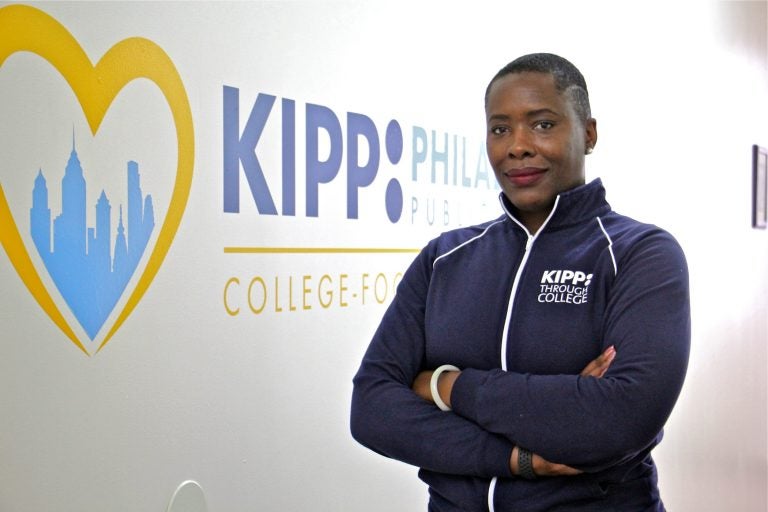To keep its alumni in college, this Philly high school is handing out ‘microgrants’
KIPP Philadelphia heard from too many alumni who were leaving college for financial reasons. It’s now giving out scholarships to fix that.

Jessica Cunningham Akoto, chief executive officer of KIPP Philadelphia. (Emma Lee/WHYY)
When college students return for winter break, Vaneeda Days’ phone starts buzzing.
It usually starts with a simple message, something like, “Hey, Ms. Days, I was wondering if you could help me.”
That message sparks a conversation, which too often leads to a common lament: I’m not sure I have enough money to go back for spring semester.
Days runs the KIPP Through College program for KIPP Philadelphia, the local branch of a national charter school chain. Her job is to make sure KIPP Philadelphia alumni stay in college, and earn the degree that, despite its cost, remains a key rung on the climb from poverty to the middle class.
It can be a daunting climb for KIPP students, many of whom are among the first in their families to attend college. Lots of little hurdles can pop up, Days said: a tweak in scholarship money or a parent losing a job. Sometimes, students just get lost in the red tape of financial aid.
In the past, Days has been only able to offer guidance. She’ll call college administrators on her students’ behalf and ask them to scour the books for any extra money that might help.
Now, though, Days will have a new weapon at her disposal — her own pot of cash.
Earlier this month, KIPP Philadelphia announced it’s one of four regional KIPP networks that will receive money to start “persistence” funds. With $37,500 in seed money from the Ludwig Family Foundation — co-chaired by Eugene Ludwig, a financial consultant and former Clinton administration official — KIPP Philadelphia will be able to give out “microgrants” to alumni besieged by unexpected money woes.
This school year, Days and her team expect to give out about a dozen scholarships in the range of $1,000 to $3,000.
The idea of microgrants has caught on at the college level, coming on the heels of data that suggests most college dropouts leave because of financial strain. Hundreds of schools now give out small scholarships to students who are on the verge of getting a degree, but have some sort of financial emergency. The idea is to make financial aid more flexible, and more responsive to the sudden changes in fortune that can cause a student to drop out.
It’s unusual, though, for high schools to give microgrants. WHYY reached out to a handful of financial aid experts and none had heard of a high school playing this role.
KIPP started experimenting with the idea in 2014 in Washington, D.C. It’s now expanding to four new regions: Philadelphia, Memphis, New York City, and the San Francisco/Bay Area.
The CEO of KIPP Philadelphia, Jessica Cunningham Akoto, was working for KIPP in DC when the program launched. It was “heartbreaking,” she said, when her former students would have to leave college over sums that middle-class families could cover without blinking.
“It wasn’t a $10,000 they owed the financial office,” she recalled. “Sometimes it was an $800 balance.”
Former KIPP student Yolanda Jordan, from Philadelphia, knows how it feels to be broke on campus. When she started at Villanova University she only had $100 in her pocket, she said. Most of that went to her cell phone bill. Trips to the dollar store covered her supplies, and she mostly borrowed books from classmates.
“There are so many things that you don’t know that you have to pay for in college when you get there,” said Jordan.
Jordan is a senior now, and has been able to make the financial math work. But she knows future students will need a boost along the way.
“It’s like when your grandma slips you $20 in your hand really quickly at a birthday party, “ she said. “It’s like, finally grandma, I needed this money.”
WHYY is your source for fact-based, in-depth journalism and information. As a nonprofit organization, we rely on financial support from readers like you. Please give today.





